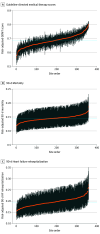Hospital Heart Failure Medical Therapy Score and Associated Clinical Outcomes and Costs
- PMID: 39320905
- PMCID: PMC11425195
- DOI: 10.1001/jamacardio.2024.2969
Hospital Heart Failure Medical Therapy Score and Associated Clinical Outcomes and Costs
Abstract
Importance: A composite score for guideline-directed medical therapy (GDMT) for patients with heart failure (HF) is associated with increased survival. Whether hospital performance according to a GDMT score is associated with a broader array of clinical outcomes at lower costs is unknown.
Objectives: To evaluate hospital variability in GDMT score at discharge, 90-day risk-standardized clinical outcomes and costs, and associations between hospital GDMT score and clinical outcomes and costs.
Design, setting, and participants: This was a retrospective cohort study conducted from January 2015 to September 2019. Included for analysis were patients hospitalized for HF with reduced ejection fraction (HFrEF) in the Get With the Guidelines-Heart Failure Registry, a national hospital-based quality improvement registry. Study data were analyzed from July 2022 to April 2023.
Exposures: GDMT score at discharge.
Main outcomes and measures: Hospital variability in GDMT score, a weighted index from 0 to 1 of GDMT prescribed divided by the number of medications eligible, at discharge was evaluated using a generalized linear mixed model using the hospital as a random effect and quantified with the adjusted median odds ratio (AMOR). Parallel analyses centering on 90-day mortality, HF rehospitalization, mortality or HF rehospitalization, home time, and costs were performed. Costs were assessed from the perspective of the Centers of Medicare & Medicaid Services. Associations between hospital GDMT score and clinical outcomes and costs were evaluated using Spearman coefficients.
Results: Among 41 161 patients (median [IQR] age, 78 [71-85] years; 25 546 male [62.1%]) across 360 hospitals, there was significant hospital variability in GDMT score at discharge (AMOR, 1.23; 95% CI, 1.21-1.26), clinical outcomes (mortality AMOR, 1.17; 95% CI, 1.14-1.24; HF rehospitalization AMOR, 1.22; 95% CI, 1.18-1.27; mortality or HF rehospitalization AMOR, 1.21; 95% CI, 1.18-1.26; home time AMOR, 1.07; 95% CI, 1.06-1.10) and costs (AMOR, 1.23; 95% CI, 1.21-1.26). Higher hospital GDMT score was associated with lower hospital mortality (Spearman ρ, -0.22; 95% CI, -0.32 to -0.12; P < .001), lower mortality or HF rehospitalization (Spearman ρ, -0.17; 95% CI, -0.26 to -0.06; P = .002), more home time (Spearman ρ, 0.14; 95% CI, 0.03-0.24; P = .01), and lower cost (Spearman ρ, -0.11; 95% CI, -0.21 to 0; P = .047) but not with HF rehospitalization (Spearman ρ, -0.10; 95% CI, -0.20 to 0; P = .06).
Conclusions and relevance: Results of this cohort study reveal that hospital variability in GDMT score, clinical outcomes, and costs was significant. Higher GDMT score at discharge was associated with lower mortality, lower mortality or hospitalization, more home time, and lower cost. Efforts to increase health care value should include GDMT optimization.
Conflict of interest statement
Figures
References
-
- Xian Y, O’Brien EC, Fonarow GC, et al. Patient-centered research into outcomes stroke patients prefer and effectiveness research: implementing the patient-driven research paradigm to aid decision making in stroke care. Am Heart J. 2015;170(1):36-45, 45.e1-11. doi: 10.1016/j.ahj.2015.04.008 - DOI - PubMed
-
- Centers for Medicare & Medicaid Services . BPCI advanced. Accessed July 25, 2023. https://innovation.cms.gov/innovation-models/bpci-advanced. - PubMed
MeSH terms
LinkOut - more resources
Full Text Sources
Medical
Research Materials
Miscellaneous


